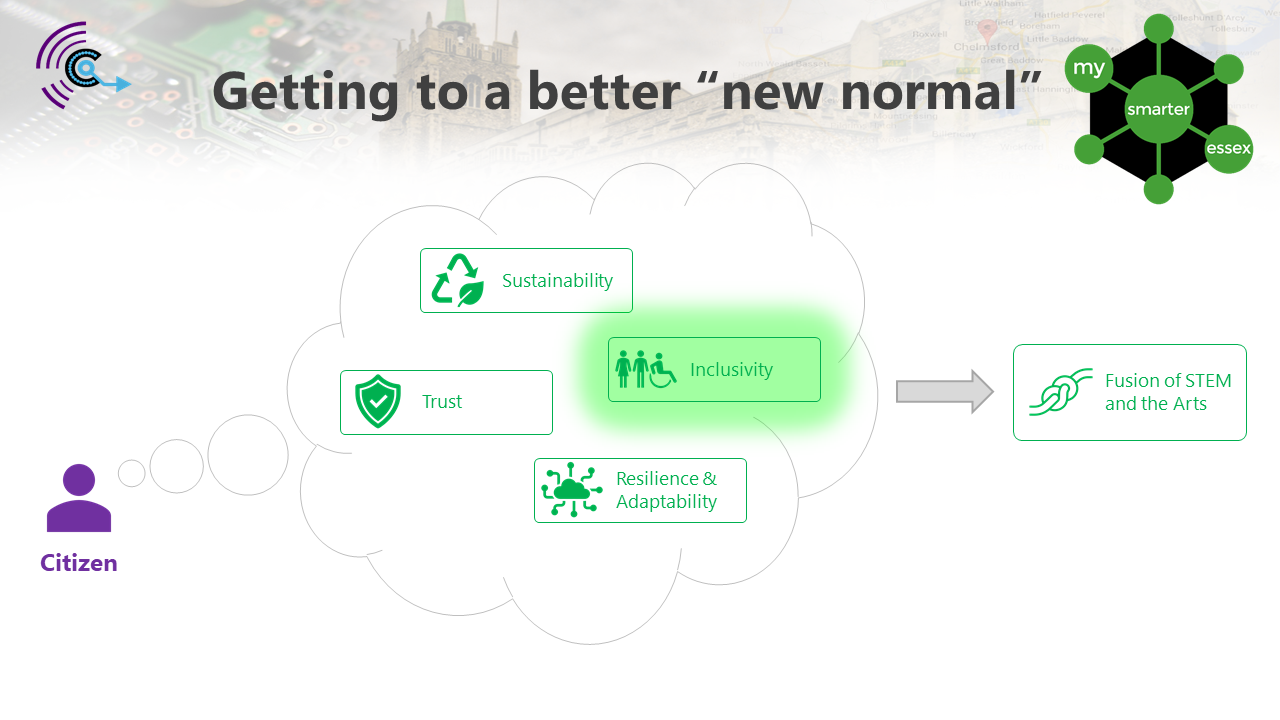
Note: this event was originally scheduled for July. This topic has stimulated widespread stakeholder interest and the new date gives us the opportunity to maximise participation.
Zoom call details:
- https://teledyne.zoom.us/j/97721107432?pwd=cVV2OTdSSFgwNjR6dWozZlUzbGIvQT09
- Meeting ID: 977 2110 7432
- Passcode: 021698
Following the CSES Covid recovery roundtable held in October 2020 and the spotlight roundtable on "Trust" in April 2021, we are now holding the second in our series of spotlight events for 2021. This is on the theme of Inclusivity.
Deprived areas and communities in Essex have a disproportionately high draw on services (high cost per capita) with correspondingly low economic output. They therefore represent a net economic drain for service providers such as Essex County Council, and an opportunity cost for other organisations such as local employers. At an individual level, it is of course simply unfair and unacceptable in today's society that such inequality exists.
Deprivation arises from three areas of inequality: economic (low income and/or employment), health (poor living conditions and/or lack of access to adequate healthcare) and education (lack of opportunity to develop skills). These are interlinked: health and education inequalities are both a major cause and effect of disparities in income and employment, in a vicious cycle.
Science and technology can, and should, be key enablers to addressing inequality by providing opportunity, connecting people, reducing costs and offering a means of "levelling up" communities, thereby unlocking productivity in a virtuous cycle. This can only happen, however, in an environment of technological and digital inclusivity; the public understanding of, and engagement in, science and technology are a critical part of this.
The event therefore aims to answer the following question: "How can we tackle economic, health and education inequality within Essex using science and technology?"
To take part, please click Register Now on the event page. This event will be delivered via Zoom: joining instructions will be provided to those who have registered.
The event is open to anyone with an interest in the subject matter who would like to help answer this question, and we would particularly encourage those from organisations working either to tackle any of the issues of economic, health or education inequality, or to amplify the voices of frequently marginalised or excluded groups, to join us.
Agenda
16:00 – Welcome and introduction
Adam Wood (CSES President) will welcome attendees and give a summary of the overall spotlight roundtable series and an overview of agenda for the afternoon.
16:05 – Understanding the problem
Gavin Jones (Chief Executive Officer, Essex County Council) will give a keynote introduction explaining the challenges of economic, health and education inequality in Essex and set out the aims for this event.
16:15 – Scene setting from the economic perspective
Gary Cousins (Capability Lead, BAE Systems Applied Intelligence) will introduce the following provocation and question:
Creating social value is no longer a “nice to have” but now a genuine competitive assessment in public tenders. Given this, how can science and technology businesses in Essex best create social value in a targeted and strategic manner?
16:25 – Scene setting from the health perspective
Peter Fairley (Director, Strategy, Policy & Integration (People), Essex County Council) will introduce the following provocation and question:
The demand for complex, person-centred care of physical and mental health is increasing and costs are rising unsustainably. Access is therefore increasingly limited. What applications of science and technology can reverse this trend and allow us to deliver integrated and inclusive health and social care – and cater for differing needs and abilities – efficiently, effectively and compassionately?
16:35 – Scene setting from the education perspective
Amy Knight (CSES Secretary and Teacher of Science, Passmores Academy) will introduce the following provocation and question:
The shift to online and remote learning brought about by the Covid-19 pandemic has shown that technology can be a significant threat to inclusion, with disparities in digital access – caused by a range of factors – leading to exaggeratedly differing outcomes and loss of social skill development. How can we turn this around, harnessing technology to deliver an integrated scientific, digital and creative education fit for today’s economy without these downsides?
16:45 – Move to discussion
Jennifer Allerton (Science and Technology Writer) will introduce the discussion format and demonstrate the collaborative whiteboard platform used to collect responses.
16:50 – Discussion in breakout groups
Attendees will be invited to join discussion groups of approximately 6-8 people to answer the following questions:
- How can science and technology businesses in Essex best create social value in a targeted and strategic manner?
- What applications of science and technology can allow us to deliver integrated and inclusive health and social care – and cater for differing needs and disabilities – efficiently, effectively and compassionately?
- How can we harness technology to deliver an integrated scientific, digital and creative education fit for today’s economy without the downsides of digital inequality?
- How can the different stakeholders work together to collectively tackle these issues?
The conversation will follow a structured format to elicit rich responses, which will be collected in real-time using the shared interactive whiteboard.
A CSES facilitator will be available to assist each group.
17:40 – Regrouping
Each group will be invited to share one key point in response to each question.
If time permits, brief questions and comments will be sought from the wider audience.
17:55 – Thanks and next steps
Adam Wood (CSES President) will thank attendees and explain what happens next.
To take part, please click Register Now on the event page. This event will be delivered via Zoom: joining instructions will be provided to those who have registered.
The event is open to anyone with an interest in the subject matter who would like to help answer this question, and we would particularly encourage those from organisations working either to tackle any of the issues of economic, health or education inequality, or to amplify the voices of frequently marginalised or excluded groups, to join us.
